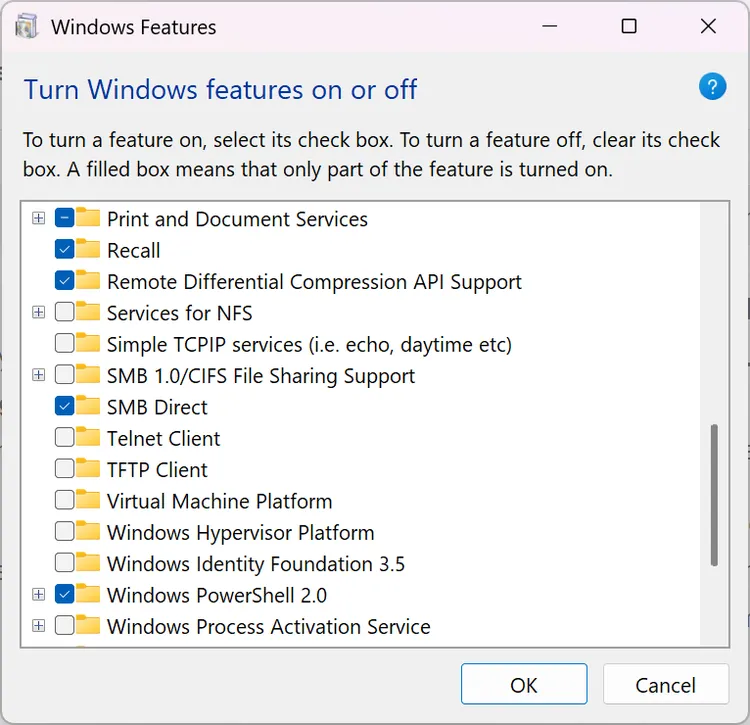Microsoft is working to fix Recall showing up as an optional Windows 11 feature.
The latest update to Windows 11 introduced an intriguing yet misleading change, sparking conversations among users and tech enthusiasts alike. It seemed as though Microsoft’s controversial Recall feature could now be easily uninstalled, thanks to a new option in the Windows Features section. However, the tech giant was quick to clarify that this is simply a bug, and not an intentional feature.
The confusion began last week when Deskmodder, a well-known German tech site, spotted the change in the latest 24H2 version of Windows 11, specifically in the KB5041865 update. The update appeared to provide users with the ability to remove Recall from their systems via the “Turn Windows features on or off” dialog in Control Panel. This discovery led to speculation that Microsoft might be offering users more control over this highly-debated feature. But the reality is quite different.
Brandon LeBlanc, Senior Product Manager at Microsoft, swiftly addressed the matter, stating, “We are aware of an issue where Recall is incorrectly listed as an option under the ‘Turn Windows features on or off’ dialog in Control Panel. This will be fixed in an upcoming update.” LeBlanc’s statement clearly indicates that the option to uninstall Recall was never intended and will soon be corrected.

The Recall Feature: A Controversial Introduction
Recall, an AI-driven feature designed to create snapshots of almost everything you see or do on your computer, has been a topic of intense debate since it was first announced. Originally set to launch in June alongside Copilot Plus PCs, the feature was delayed due to serious security concerns raised by researchers. The primary issue revolved around the unencrypted database that stores these snapshots, making it vulnerable to potential malware attacks.
Microsoft responded by making significant changes to Recall, including encrypting the database, authenticating access via Windows Hello, and transforming it into an opt-in feature rather than being enabled by default. Despite these improvements, the feature continues to raise eyebrows among privacy advocates and users who are wary of its extensive tracking capabilities.
What’s Next for Recall?
Microsoft is on track to preview Recall with Windows Insiders on Copilot Plus PCs in October. This move follows the additional development time needed to address the concerns raised by security experts. The company’s efforts to refine the feature underscore its commitment to balancing innovative AI functionalities with robust security measures.
While Microsoft has confirmed that the current listing of Recall as an uninstallable feature is a mistake, the situation remains fluid. We inquired whether the company has any plans to allow users to fully uninstall Recall in the future, especially in light of regulatory pressures from the European Union. The European Commission’s Digital Markets Act, which aims to ensure fair competition and user choice, may compel Microsoft to introduce an uninstall option for Recall in EU versions of Windows 11. This wouldn’t be the first time Microsoft has had to comply with such regulations; the company already added an uninstall option for its Edge browser in European Economic Area (EEA) countries, as well as the ability to remove Bing-powered web search from the Start menu.
A Bug Today, A Feature Tomorrow?
For now, Microsoft assures users that the Recall uninstall option is just a bug, but the story doesn’t end there. With ongoing developments and the ever-changing landscape of digital privacy laws, the possibility of this becoming a permanent feature remains open. As Microsoft continues to tweak and improve Recall, the company will need to navigate not just technical challenges, but also the evolving expectations and demands of its global user base.
Stay tuned for more updates as Microsoft prepares to roll out the next wave of changes to Windows 11, addressing this bug and further refining the controversial Recall feature. The balance between innovative AI and user privacy is delicate, and it’s clear that Microsoft is working to get it just right.










